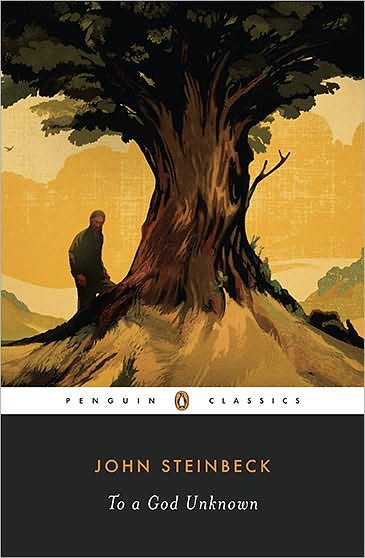To A God Unknown, John Steinbeck
/

One of the latest books that I've read recently is John Steinbeck's To A God Unknown, his second novel, and a recipient of the Nobel Prize in Literature. The story, which looks to the Bible, ancient myths, paganism and several other influences, weaves together a story about belief and faith, mixing reality and fantasy in what I would really call a speculative fiction novel.
Set in the 1800s, the book follows the story of the Joseph Wayne, a Vermonter, who yearns to go out west, and receiving the blessing from his father, he does so, only to learn that his father has passed away shortly after he settles in California. At that moment, Wayne believes that his father's spirit and soul has become imbued with the giant oak tree next to the house, and in his own way, be worships the tree. His three brothers move out west to his farm, and for a time, the valley is teeming with life. The brothers come across a rock in a glade, with a stream coming out of it, and discover that it is a sacred place to the Indios. Soon thereafter, Benjy, their youngest, alcoholic brother, is killed in a scuffle by Juanito, one of the farmhands, who vanishes.
One brother, Burton, is a devout Christian, and becomes angry with his brother for his interactions with the oak tree, believing it to be of darker powers at work, which go against his own beliefs. He leaves the farm, but not before killing the tree. This has dire consequences for the valley, which begins to dry up as a drought sets in, which begins to kill the land. More accidents come. Joseph's wife, Elizabeth, falls to her death at the rock, and Joseph and Thomas decide to leave the farm, bringing their cattle to greener pastures. Joseph stays, and is rejoined by Juanito, who convinces Joseph to visit the local priest. When Joseph tries to get the priest to pray for the land, he refuses, and tells Joseph that he is sick, and offers his own help. Joseph returns to the glade to find that the stream coming out of the rock has dried up. When he decides to leave, he gets cut. Inspired, he climbs on top of the rock, cuts his wrists open, sacrificing himself, and soon after, it begins to rain.
I have long been a fan of John Steinbeck, ever since I first read his short novella, Of Mice and Men in Mrs. Page's English class at Harwood Union High School, and I moved on to a number of his other books - Cannery Row, Travels With Charley, The Pearl, The Red Pony, and The Grapes of Wrath - I've long loved the Americana element of his writing, and for me, he is one of the quintessential American writers, one who touches deeply on themes of the country. Recently, I've become interested in reading more of his books, and while browsing through the bookstore, I came across this book, and was interested because at a first glance, it fell squarely within the speculative fiction range, retelling elements of the Bible, older religions and myths to bring about an interesting story. There are a number of pure fantastic elements as well, right down to the last actions of the book, when Joseph dies, and his spirit renews the land from his soul and belief.
I've long believed that stories aren't really defined by their physical story elements - the characters, locations and items that they use - but by the ways in which the characters perceive their environment around them, and use the actions of the story to learn. To A God Unknown is about belief and faith of the strongest type: the intangible, the unknowable, and the impossible. Throughout the story, Joseph is a character that believes strongly in the land and its well being, and perceives of some higher power in ways that are not, to say the least, traditional, and raising the ire of his family and community members. Yet, while reading, Joseph's actions demonstrate that he has the most honest and raw form of belief: he believes in the land, and sees his actions rewarded in any number of ways, and punished in others. For me personally, this was an interesting book because I'm not sold on the concept of God, as proscribed by any number of religious institutions. My beliefs lie somewhere with Josephs: God, or any higher power that escapes definition, is something that is unknowable, intangible and mysterious.
The last pages of the book were by far one of the most important that I read, in almost anything, when Joseph goes to a priest, looking to help save the land. The priest refuses, saying that his job is to ensure the salvation of the human soul, not that of the land, setting up a major divide between the anarchical views that Joseph takes, as opposed to a major institution such as the Catholic Church. In a way, Joseph believes in the entirety of the universe, which felt far more basic and universal than the Church, which looks simply to one of God's (If there is one who created everything) creations for their own benefit. This has never, and still doesn't, sit well with me, and I prefer Joseph's more universal, general view on how the world runs. This falls with a number of other world views, and it's interesting to see this all presented in a novel such as it was. Steinbeck has created a wonderful, fantastic novel with To A God Unknown, and one that has left me thinking far more than I thought it would have.
